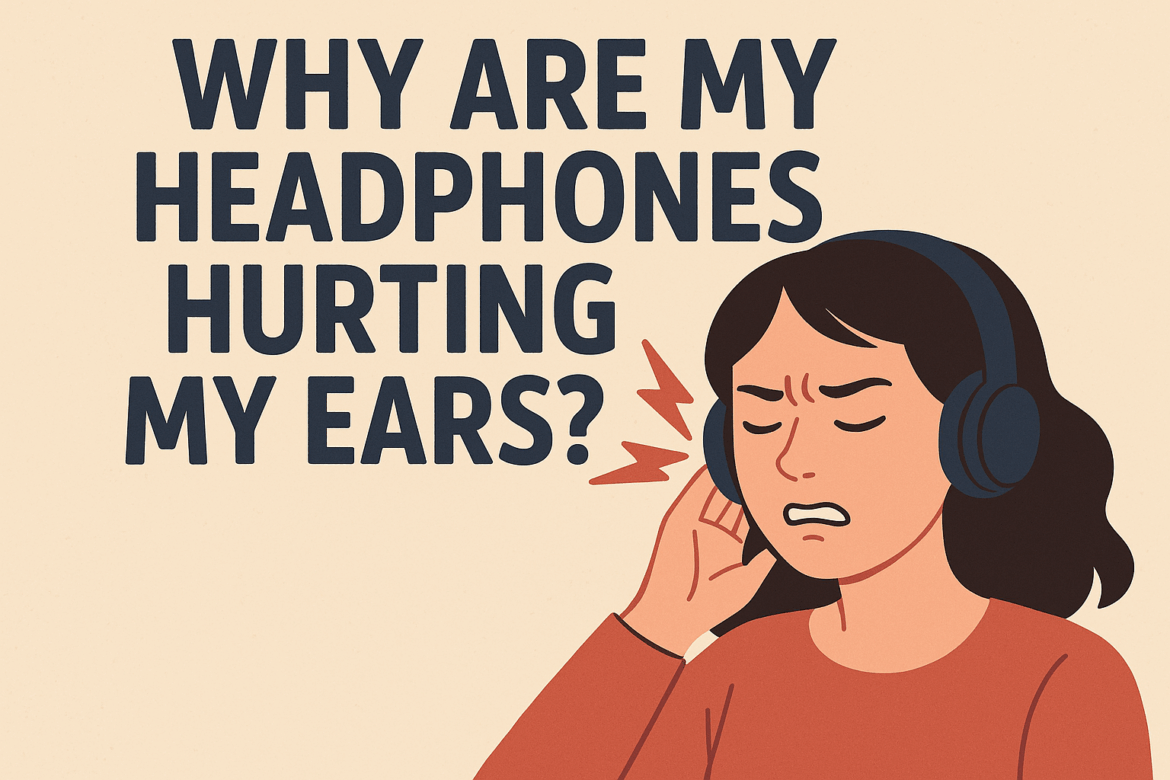There you are, nestled in your favorite chair, ready to be enveloped by the rich tapestry of sound that only your beloved headphones can deliver. But instead of the expected auditory symphony, you’re greeted by a nagging discomfort. Why, you wonder, are your headphones hurting your ears? This question, seemingly simple, unravels a complex web of factors that affect how we experience sound. Journey with me as we explore the labyrinthine world of headphones and our auditory health, and uncover the reasons behind this all-too-common issue.
Understanding the Pain: Physical Discomfort
Clamping Force and Fit
The very design of headphones can be a source of discomfort. The clamping force, or the pressure exerted by the headphones on your head, is a crucial factor. While designed to keep headphones in place, excessive clamping force can lead to headaches and sore ears. This is especially true for over-ear and on-ear headphones, where the fit around or on the ear must be snug but not constricting.
Table: Common Headphone Types and Their Fit
| Headphone Type | Fit Description | Potential Discomforts |
|---|---|---|
| Over-Ear | Surrounds the ear | Clamping force, heat |
| On-Ear | Rests on the ear | Clamping force, pressure points |
| In-Ear | Inserted into the ear canal | Ear canal irritation |
To alleviate this, consider headphones with adjustable headbands or memory foam ear cups. Adjustments can significantly reduce the pressure while maintaining sound quality.
Ear Cup Material
The material of the ear cups also plays a significant role. Leatherette or synthetic materials can cause sweating and discomfort during extended listening sessions. Opt for breathable fabrics or high-quality leather that allow for better air circulation and comfort.
The Sound Factor: Audio Quality and Volume
Volume Levels and Hearing Damage
It’s not just the physical fit that can cause discomfort; how you listen to your music matters too. Listening at high volumes can cause temporary or permanent hearing damage. The World Health Organization recommends keeping the volume below 85 decibels for safe listening.
The Decibel Scale: Understanding Volume Levels
| Decibel Level | Description | Risk of Hearing Damage |
|---|---|---|
| 60 dB | Normal conversation | Safe |
| 85 dB | Busy traffic, prolonged exposure | Risk begins after 8 hours |
| 100 dB | Chainsaw | Risk after 15 minutes |
| 120 dB | Rock concert | Immediate risk |
Using noise-canceling headphones can help you enjoy your music at lower volumes by reducing background noise, minimizing the need to crank up the volume.
Sound Profile and Frequency Response
The sound profile of your headphones, including the bass, mids, and treble, can affect how comfortable they are to listen to over time. Headphones with exaggerated bass might sound thrilling at first but can lead to listener fatigue. Consider headphones with a balanced sound profile that won’t overemphasize any particular frequency range.
Hygiene and Health: Ear Health Concerns
Earwax Build-up
In-ear headphones, while great for portability, can contribute to earwax build-up, which can cause discomfort or even infections. Regular cleaning of both your ears and your earphones can mitigate this issue. Ensure your earbuds are dry before use, and clean them with a soft cloth or specialized cleaning tool.
Allergic Reactions
Materials used in headphones can sometimes cause allergic reactions, manifesting as itching or rashes. If you notice such symptoms, check the materials used in your headphones and consider switching to hypoallergenic options.
The Ergonomic Solution: Finding the Right Headphones
Personal Fit and Customization
Finding the right pair of headphones is akin to finding the perfect pair of shoes – it requires consideration of your unique needs and preferences. Opt for models that offer customizable features, like adjustable headbands and interchangeable ear pads. Trying different styles and brands can lead to discovering a fit that minimizes discomfort.
Professional Consultation
If discomfort persists, it may be worth consulting with an audiologist. They can provide insights into your auditory health and recommend headphones that suit your specific needs, ensuring a comfortable listening experience.
Conclusion: Crafting Your Acoustic Sanctuary
The journey to finding the perfect pair of headphones is as much about understanding your own needs as it is about understanding the products available. By considering factors such as clamping force, volume levels, and material, you can transform your listening experience from one of discomfort to one of pure, unadulterated pleasure.
So next time your headphones begin to pinch or your ears start to ache, remember that a world of solutions awaits. It’s all about crafting your own acoustic sanctuary, where sound is not just heard, but truly felt. Dive into this journey with the knowledge and tools you need, and let the music play on without pain.
Last Updated on September 22, 2025
